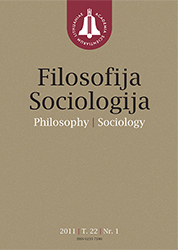Kriminalinė viktimizacija ir rizikos kaimynystė Vilniaus, Kauno ir Klaipėdos skirtingo tipo mikrorajonuose
The criminal victimization and risk neighbourhood in different areas of Vilnius, Kaunas and Klaipėda Cities
Author(s): Ilona TamutienėSubject(s): Social Sciences
Published by: Lietuvos mokslų akademijos leidykla
Keywords: crime; victimization; different areas of the city; risk neighbourhood index
Summary/Abstract: The aim of this article is to analyze criminal victimization in different areas of major Lithuanian cities (Vilnius, Kaunas and Klaipėda) and to evaluate the link between the risk neighbourhood factors and the citizens’ apprehension of risk in the near neighbourhood to become a victim. The quantitative survey was carried out. Area sampling was used to choose the respondents from the old town, the working class area, the area of Soviet construction and the suburban zone. The data analysis makes it possible to conclude that the suburban areas of the cities are the defensive space. It is in this area that people can walk safely in the evening; also actual experience of victimization is at its lowest level. Risk neighbourhood index including variables of violence and disorder is also the lowest in the suburbs. Factors influencing risk neighbourhood in the suburbs is also low. On the contrary, the Soviet blocks of flats and old working class residential areas are spaces that were more dangerous. Significant factors for the risk neighbourhood such as the number and density of alcohol purchasing points, as well as the density of public use of alcohol and the possibility to buy it after 10 p. m. in the Soviet blocks of flats and old working class residential areas are also high. While continuing this investigation, more attention should be given to the analyses of the factors determining safety in such areas. Local authorities and communities should care about dangerous spaces, lighting them up and patrolling round for their residents’ safety. Municipalities giving licences and supervising on alcohol trade should take into consideration the social expenditure, i. e. growing crime, littering, noise, damaging of public and private wealth, violence in families.
Journal: Filosofija. Sociologija
- Issue Year: 2012
- Issue No: 4
- Page Range: 228-236
- Page Count: 9
- Language: Lithuanian

